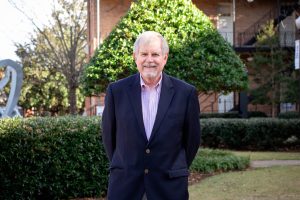
From the February 2022 Desktop News | When Dr. David Dixon was an undergraduate student at the California Institute of Technology, he was awarded a scholarship from the ARCS Foundation to help him with his tuition. Now, as a world-renowned computational chemist and Robert Ramsay Chair in the UA Department of Chemistry and Biochemistry, he has been named to the foundation’s Alumni Hall of Fame.
The ARCS Foundation is a prestigious national organization committed to furthering science through the financial support of STEM undergraduate and graduate students. Since 1958, it has awarded more than $120 million to over 10,000 students. The Alumni Hall of Fame recognizes ARCS scholars who have made significant contributions in their fields, including astronaut Dr. Jessica Meir, U.S. healthcare writer and advocate Shannon Brownlee, and astrophysicist and media personality Dr. Neil deGrasse Tyson.
“I am extremely grateful to the ARCS Foundation for your support of me as an undergraduate at Caltech and I gratefully accept the honor of being named to the ARCS Alumni Hall of Fame,” Dixon said in a statement released by ARCS.
Dixon, whose work applying numerical simulation methods has led to numerous scientific discoveries and breakthroughs, has been heavily involved in research to solve problems in energy and the environment. Before moving to The University of Alabama, he held positions at DuPont Central Research and Development and Pacific Northwest National Laboratory.
Currently, one of Dixon’s large projects focuses on the use of hydrogen as a sustainable energy alternative. Supported by grants from the U.S. Department of Defense and the Department of Energy, Dixon and his team are researching using hydrogen as a fuel that burns quickly or to power a fuel cell. This would allow a renewable energy resource that releases no carbon dioxide into the atmosphere.
“In our approach to converting energy, we do not eliminate the waste after energy release into the environment as we do when we release carbon dioxide when burning fossil fuels to power our cars,” Dixon said. “Our goal is to release the hydrogen and make only water so that we don’t impact the environment. We keep the waste on board so that it can be regenerated by adding hydrogen back to the waste to generate a fuel with the hydrogen coming from splitting water using solar or nuclear power.”
In addition to a legacy of groundbreaking research, Dixon also has a legacy of mentorship. Each year, Dixon mentors undergraduate and graduate students, allowing them to assist with research or even create their own projects. One of Dixon’s mentees and current graduate student at Washington State University, Ashley Hunt, is also an ARCS fellowship recipient, which makes this full-circle moment even more special for him.
To learn more about the ARCS Foundation, visit their website.